Updated 4/4 to include responses from IOI Corporation Bhd and RAN
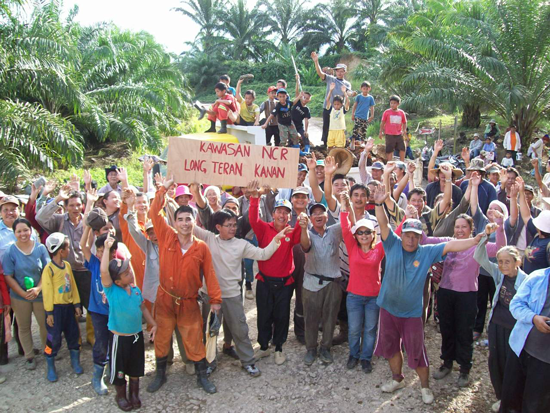
People of Long Teran Kenan blockading the road to their lands in Sarawak. Image courtesy of RAN.
A community in Malaysian Borneo seized an oil palm plantation belonging to the IOI Group after the palm oil giant failed to respect the terms of a court ruling that the plantation was established on native customary land, reports the Rainforest Action Network (RAN).
According to the San Francisco-based activist group, the action came after months of inaction by IOI, following the March 2010 court decision that two concessions held by the palm oil company were planted on community lands. Despite the ruling, IOI continued to operate its plantations. It also broke its commitment not to appeal the court decision, according to RAN. So earlier this month, the people of Long Teran Kenan blocked the road and occupied the plantation. They have since started harvesting and selling the fruit to a nearby palm oil mill.
RAN is highlighting the situation because IOI supplies palm oil to Cargill, America’s largest palm oil importer. RAN says Cargill has failed to enact policies that protect against such abuses.
“Cargill is the number one importer of palm oil into the US,” writes Lindsey Allen, RAN’s Forest Program Director, on the green group’s Understory Blog. “This gives Cargill enormous influence over global palm oil markets, including how palm oil is produced, refined and distributed.”
“For more than three years, RAN has pushed Cargill to adopt basic safeguards that would ensure the company is not importing human rights violations, rainforest destruction, and climate change. Because Cargill has to date failed to institute these safeguards, controversial palm oil is still found throughout American supermarkets.”
,
Cargill did not respond to request for comment from mongabay.com, but in an emailed statement, IOI disputed the charges.
IOI said the High Court of Sarawak did not grant “the natives” the right to reclaim the contested land and added that the natives’ customary rights on the land “can be extinguished by paying compensation.” IOI further stated that the court “did not grant any injunctions sought by the natives restraining IOI Pelita from remaining and continuing its operations on the lands.” Therefore IOI believes the actions by the people of Long Teran Kenan are “illegal.”
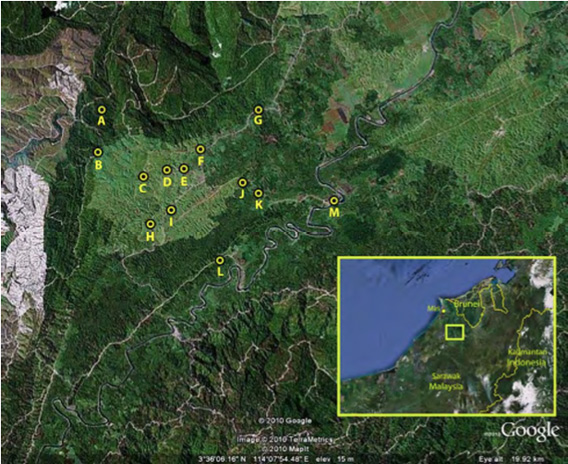 Location map showing key areas visited during field study by the NGO Grassroots (from Case study of IOI Pelita Plantations operations and practices, and its impact upon the community of Long Teran Kanan, Tinjar, Baram, Sarawak, Malaysia): A) IOI workers’ housing B) View of recent land clearing activities by IOI C) IOI’s agrochemical storage and mixing area D) Sungai Tegai E) IOI’s waste dumping area F) IOI Tegai Estate entrance / IOI cuts off community farmer’s access to farm G) Community water intake point / Community water catchment area / Community farmer Malang Jok’s land H) IOI workers’ illegal burial grounds I) IOI promises assistance with road repairs J) View of IOI’s oil palms on community land K) Gas pipeline project L) IOI Tegai Estate office M) Kampung Long Teran Kanan |
But RAN’s Allen was not satisfied with IOI’s response.
“IOI Corporation’s interpretation that ancestral rights can be ‘extinguished’ through monetary compensation is not only offensive, but is indicative of IOI’s lack of commitment to respectful engagement with people of Long Teran Kenan,” she told mongabay.com.
“Rainforest Action Network disputes IOI’s accusation that the native customary landholders are ‘illegal’ and will continue to stand in solidarity with the community of Long Teran in its fight to reclaim ancestral lands from one of the most powerful palm oil companies if the world. I repeat the question raised to IOI that went unanswered in its response to RAN: Will IOI Group negotiate in good faith or will it continue to pursue disingenuous legal interpretations to contest the legitimacy of the Indigenous community?”
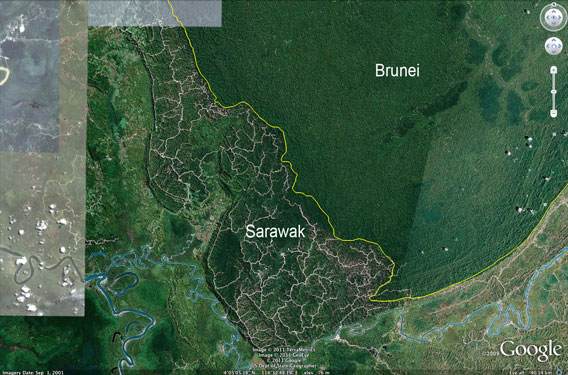
Logging roads and damaged forest in Sarawak compared with healthy forest in Brunei. Photo courtesy of Google Earth.
Sarawak’s diminishing rainforests
Sarawak’s forests have been heavily impacted by logging and plantation development over the past three decades. Last year the government announced a plan to expand its oil palm estate by more than a million hectares (2.5 million acres) over the next decade. James Masing, Sarawak’s Land Development Minister, said native customary lands would be targeted for plantation development.
Forestry companies in Sarawak are known to enjoy close ties to the government, including Chief Minister Pehin Sri Abdul Taib Mahmud, who has been linked to overseas properties worth hundreds of millions of dollars. The origins of these holdings remain unexplained.
Environmentalists say less than 10 percent of Sarawak’s primary forest cover remains.
Related articles
Google Earth reveals stark contrast between Sarawak’s damaged forests and those in neighboring Borneo states
(03/28/2011) Images from Google Earth show a sharp contract between forest cover in Sarawak, a state in Malaysian Borneo, and the neighboring countries of Brunei and Indonesia at a time when Sarawak’s Chief Minister Pehin Sri Abdul Taib Mahmud is claiming that 70 percent of Sarawak’s forest cover is intact.
Report: corruption in Sarawak led to widespread deforestation, violations of indigenous rights
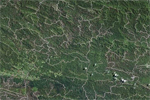
(03/10/2011) At the end of this month it will be 30 years since Abdul Taib Mahmud came to power in the Malaysian state of Sarawak. Environmentalists are using the occasion, along with new revelations, to highlight corruption and nepotism they say have characterized his regime. Chief Minister Taib and his decades-long administration are no strangers to such allegations, but a new report from the indigenous-rights group Bruno Manser Fund (BMF)—amid criticism from independent media sources, such as Sarawak Report and Radio Free Sarawak—are adding fuel to the fire. Most recently, the report describes in great detail how the tropical timber trade in Sarawak has undercut indigenous groups while toppling some of the world’s greatest rainforests, all at the expense of the Sarawak people.
Sarawak’s last nomad: indigenous leader and activist, Along Sega, dies

(02/03/2011) Along Sega never knew exactly how old he was, but when he passed away yesterday in a hospital far from the forest where he born, he was likely in his 70s. Leader among the once-nomadic hunter and gatherer Penan people of Borneo and mentor to Swiss activist, Bruno Manser, Along Sega will be remembered for his work to save the Penan’s forest—and their lifestyle and culture—from logging companies, supported by the Sarawak government and provided muscle by the state police.
Malaysian palm oil producers destroying Borneo peat forests faster than ever before
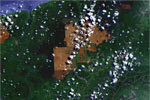
(02/01/2011) Peatlands and rainforests in Malaysia’s Sarawak state on the island of Borneo are being rapidly destroyed for oil palm plantations, according to new studies by environmental group Wetlands International and remote sensing institute Sarvision. The analysis shows that more than one third (353,000 hectares or 872,000 acres) of Sarawak’s peatswamp forests and ten percent of the state’s rainforests were cleared between 2005 and 2010. About 65 percent of the area was converted for oil palm, which is replacing logging as timber stocks have been exhausted by unsustainable harvesting practices.
Rainforest people sue logging company, Sarawak govt over planned deforestation
(12/22/2010) A community of forest people is taking a logging company and the state government of Sarawak to court over a plan to log 15,000 hectares of tropical rainforest, reports the Bruno Manser Fund.
Sarawak to double oil palm plantations by focusing on native customary forest
(11/30/2010) Sarawak plans to double its oil palm estate by 2020, reports The Star.
Misleading claims from a palm oil lobbyist
(10/23/2010) In an editorial published October 9th in the New Straits Times (“Why does World Bank hate palm oil?”), Alan Oxley, a former Australian diplomat who now serves as a lobbyist for logging and plantation companies, makes erroneous claims in his case against the World Bank and the International Finance Corp (IFC) for establishing stronger social and environmental criteria for lending to palm oil companies. It is important to put Mr. Oxley’s editorial in the context of his broader efforts to reduce protections for rural communities and the environment.
Photos: Massive logjam in Borneo blocks Malaysia’s longest river
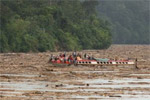
(10/10/2010) A massive 50-km-long (30-mi) logjam has blocked the Rajang river in Sarawak, Malaysian Borneo, bringing river traffic to a standstill and posing a threat to riverbank communities, reports Malaysian state media, Bernama. The Rajang, Malaysia’s longest river, is presently unnavigable, according to Bernama. The source of the logs and debris is believed to be the Baleh River and upper tributaries of the Rajang. Heavy rain reportedly triggered a landslide or landslides at log ponds at a major timber camp.